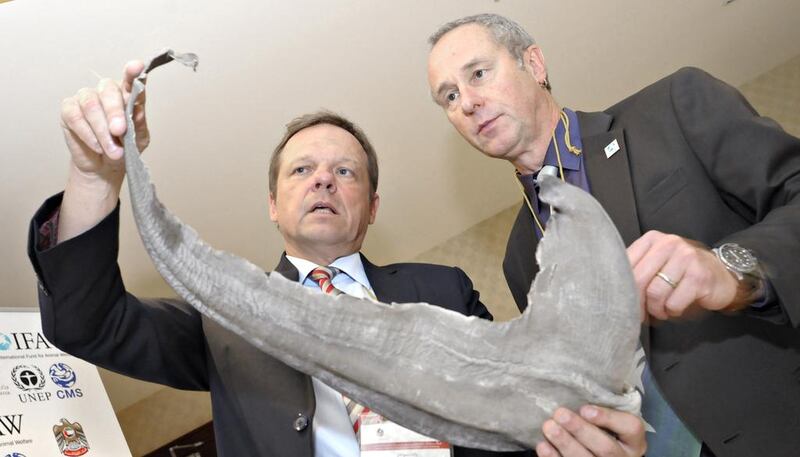DUBAI // The UAE and eight other countries signed up on Monday to a global conservation agreement to protect sharks.
The ratification took place in Dubai on the first day of a conservation training workshop organised by the International Fund for Animal Welfare and the Ministry of Environment and Water.
“We are really proud to host this workshop and to host the signing of the agreement,” said Ahmed Al Hashimi, director of the ministry’s biodiversity department.
“The importance of this document is that it focuses on migratory species which are travelling from country to country, across borders. So that is why we need to have regional collaboration and cooperation, in order to protect them.”
The areement is not legally binding and countries with key shark fisheries such as Oman have not signed, but conservationists believe it will have a positive impact on the future of threatened shark species.
“This is the only global instrument for the conservation of migratory sharks,” said Peter Pueschel of the animal welfare fund.
Until yesterday there were only 27 signatories which means that the addition of the nine new arrivals “really boosts the membership and shows a leadership from the Arab region here on that matter”.
“We are also optimistic that more Arab countries will join,” he said.
“That agreement can make big difference in the intention of the governments to do the assessments and take precautionary legislative measures to avoid any overexploitation of sharks species, and this within international cooperation.”
The need to conserve sharks is urgent, said Mr Pueschel. Out of about 500 known species of shark and rays, 74 are registered as threatened by the International Union for Conservation of Nature. Of these at least 20 are found in the waters of the region.
Unregulated fishing, especially to supply the lucrative shark fin trade in the Far East, is a major cause of the global decline of many shark species.
From September 14 this year, the global trade in five species of endangered sharks will be strictly regulated by the Convention on the International Trade in Endangered Species of Wild Fauna and Flora, or Cites.
The Dubai workshop, which runs until 19 February, will train customs, conservation and fisheries officials from the region on how to implement the new rules.
The oceanic whitetip, the porbeagle and three species of hammerhead sharks are now included in what is known as Appendix II under Cites.
This means trading them across borders is possible only with a certificate from an authorised national authority stating that catching them is not a threat to local populations.
While the first two species do not inhabit seas off the UAE, the other three – the smooth, great and scalloped hammerhead – do.
One challenge in implementing the new rules is to train customs and fisheries officials to recognise the concerned species.
The event in Dubai has gathered more than 65 officials from 12 countries. They will be trained in practical exercises, showing them what to look for when dealing with sharks and shark fins, as well as Cites documents.
The shark conservation agreement is part of the Convention on the Conservation of Migratory Species of Wild Animals, a United Nations initiative. The other nations who signed are the Comoros Islands, Egypt, Jordan, Libya, Mauritania, Sudan, Yemen and Syria.
vtodorova@thenational.ae





